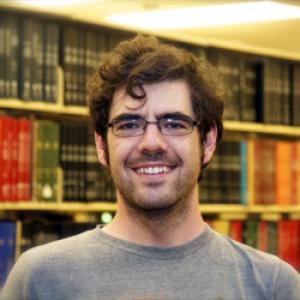Michael Thomas Smith is a reader, writer, playwright, novelist, musician, researcher, teacher, pinball player, and impromptu traveler who drinks both coffee and tea every morning and has a fondness for petrichor.
Petrichor?
It’s that earthy scent especially common after light rain, caused when oil exuded by plants into dry soil is released into the air by falling water. “It’s a life thing, a nature thing, a spring/summer thing,” Michael says. “I like rain better than snow, hands down. It’s not about being sad! I actually kind of like the rain because you have that nice smell.”
And you have that nice word, too. Finding the right word is one of the many ways Michael expresses himself. “Writing is fun for me. I do a lot of screen plays, plays, and novels. And I play about 10 different instruments to varying levels — guitar, bass guitar, ukulele, banjo, mandolin, harmonica, piano. I started playing trumpet in 5th grade. When I was in college, I picked up piano, then guitar. It became a habit of new experiences. About every three years I’d buy an instrument and try to get good enough to play radio songs.”
There’s another way Michael keeps his mind stimulated. “I’m a pinball maniac! I don’t have a machine of my own, but there’s a pinball place downtown which opened about five years ago. It’s my main hangout.”
For two years, Michael worked for United Airlines. “The biggest perk was you could fly for free on standby. I didn’t have much vacation time right out of college, so I’d do these ‘guerrilla impromptu trips’ to anywhere there were empty seats, domestic or international, for weekends. It really opened my eyes, brought me into the humanities, and helped me appreciate different cultures. It was very influential in my life.”
Having so many passions, from petrichor to pinball, helps Michael make connections with students. “I really like finding out what students are passionate about. You can take any one of your passions and see how to spend an inordinate amount of time working at it. So I like to acknowledge what students like, foster it, and connect it with what we’re doing in class. It helps everybody grow. It’s a step toward finding out what they want to use their technical skills for after college.”
Discovering your passions is what education should be about, Michael says. “Find something you like, no matter what it is. Then go for it!”

